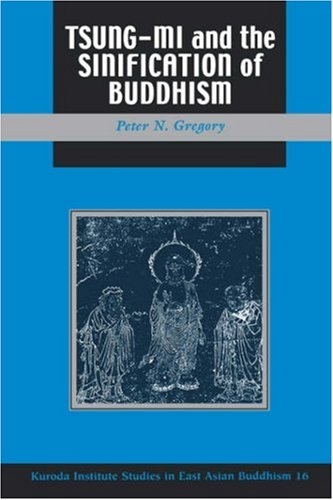- Acknowledgmentsxi
- Abbreviationsxiii
- CHAPTER ONE
- Introduction3
PART ONE: Tsung-mi's Life
- CHAPTER TWO
- A Biography of Tsung-mi27
- Classical Background (780–804)28
- Ch'an Training and the Scripture of Perfect Enlightenment (804–810)33
- Ch'eng-kuan and Hua-yen (810–816)58
- Early Scholarship (816–828)68
- Literati Connections (828–835)73
- The Sweet Dew Incident (835)85
- Later Years and Death (835–841)88
PART Two: Doctrinal Classification
CHAPTER THREE
Doctrinal Classification 93
The Hermeneutical Problem in Buddhism 93
The Chinese Context 104
CHAPTER FOUR
Doctrinal Classification in the Hua-yen Tradition 115
Chih-yen's Classification Schemes 117
Fa-tsang's Classification Scheme 127
Tsung-mi's Classification Scheme 134
CHAPTER FIVE
The Sudden Teaching 136
The Sudden Teaching According to Fa-tsang 137
The Problematical Nature of the Sudden Teaching 142
The Sudden Teaching and Ch'an 144
The Sudden Teaching in Tsung-mi's Thought 146
CHAPTER SIX
The Perfect Teaching 154
The Samadhi of Oceanic Reflection 154
Two Paradigms 157
The Shift from Shih-shih wu-ai to Li-shih wu-ai 162
The Teaching that Reveals the Nature 165
The Scripture of Perfect Enlightenment 167
PART THREE: The Ground of Practice
CHAPTER SEVEN
A Cosmogonic Map for Buddhist Practice 173
The Five Stages of Phenomenal Evolution 173
Nature Origination and Conditioned Origination 187
Sudden Enlightenment Followed by Gradual Cultivation 192
Tsung-mi's Ten-Stage Model 196
CHAPTER EIGHT
The Role of Emptiness 206
A Cosmogony-Derived P'an-chiao 206
Tsung-mi's Theory of Religious Language 209
The Meaning of Awareness 216
The Tathāgatagarbha Critique of Emptiness 218
CHAPTER NINE
Tsung-mi's Critique of Ch'an 224
Ch'an and the Teachings 224
Critique of the Different Types of Ch'an 230
Historical Context 244
PART FOUR: The Broader Intellectual Tradition
CHAPTER TEN
Confucianism and Taoism in Tsung-mi's Thought 255
Tsung-mi's Extension of P'an-chiao to the Two Teachings 256
Tsung-mi's Critique of Confucianism and Taoism 261
The Teaching of Men and Gods 279
Tsung-mi's Synthesis of Confucianism and Taoism 285
Tsung-mi's Intellectual Personality 293
CHAPTER ELEVEN
Tsung-mi and Neo-Confucianism 295
Chu Hsi's Critique of the Buddhist Understanding of Nature 297
A Common Problematic 304
The Problem of Predication 306
The Structural Parallels 309
APPENDIX I
A Note on Biographical Sources 313
APPENDIX II
A Note on Tsung-mi 's Writings 315
Glossary 327
Bibliography 335
Index 355
